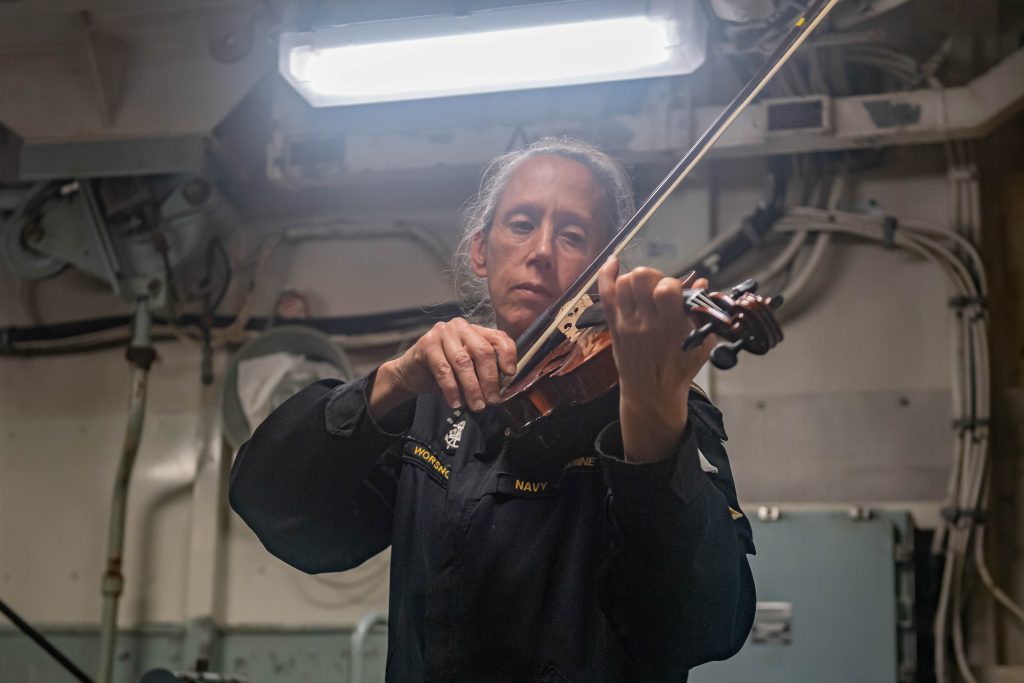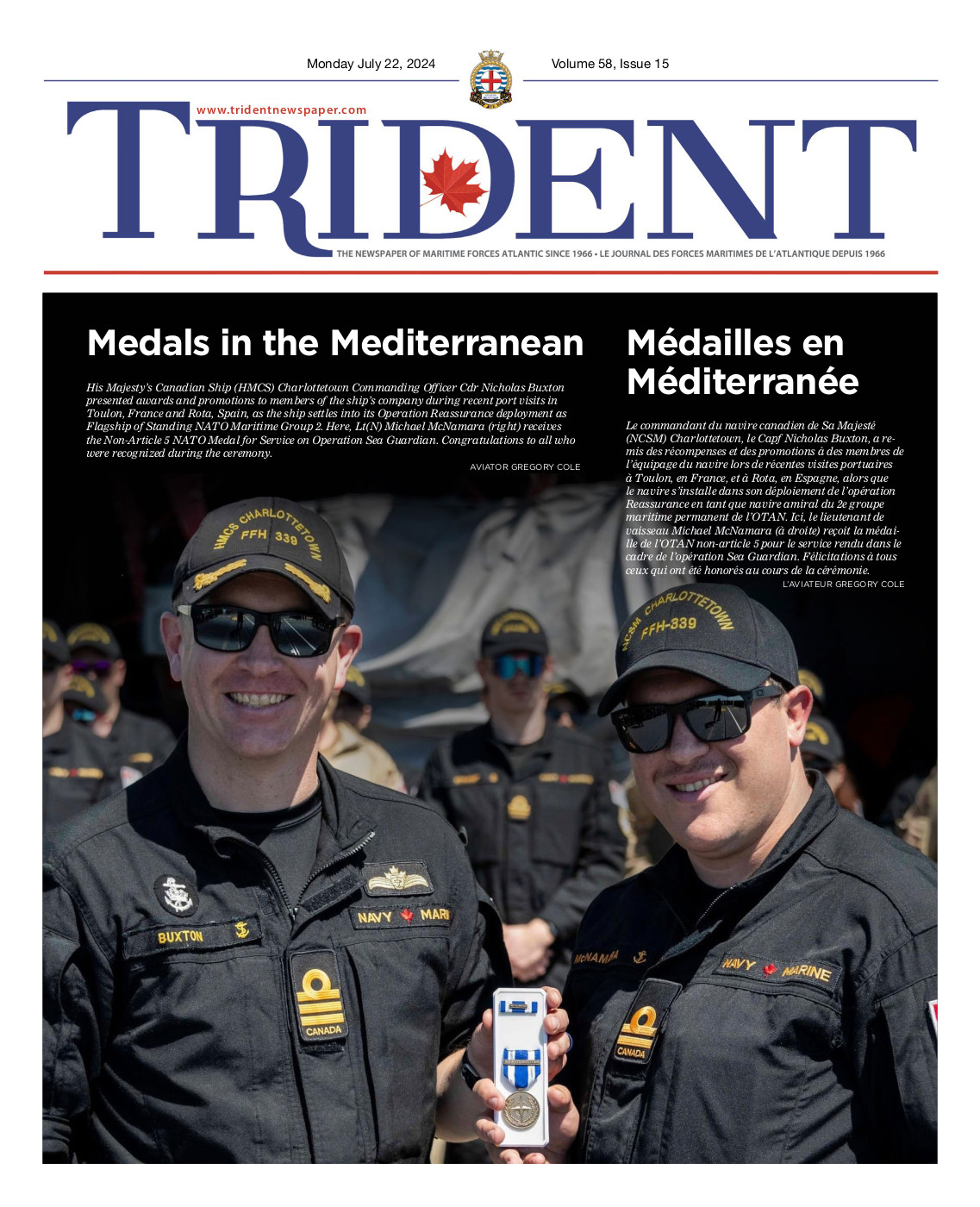
CPL JADIN GAUDETT
Sailor profile: HMCS Montréal’s shipboard violinist
By Capt Trevor Young,
Public Affairs Officer, HMCS Montréal
In the middle of the North Atlantic Ocean, in a sea-state that could turn even the strongest of stomachs, tucked away in a small room clad in metal pipes and endless wiring called the Recovery Assist Traverse (RAST) room, Petty Officer first class Meghan Worsnop claimed one of the only places on Halifax-Class Frigate HMCS Montréal to play her violin in relative peace.
PO1 Worsnop initially brought her violin aboard HMCS Ville de Québec in 2019 as a means of comfort in a new position. She had begun what’s called the Suzuki Program, a parent-child way of learning where the two begin together and when the child has picked it up and is feeling confident, the parent eventually drops out to leave the child to their own devices. However, in this case, when Worsnop’s daughter lost interest, it was the parent who continued the learning. “Dvořák is one of my favorites to play; he travelled the world, you know,” said the sailor. Surprisingly, despite a deck that seems to move in opposing 35-degree angles every 15 seconds and the melodies that tend to be drowned out amid the clambering of the ship’s watertight doors, Worsnop finds it easier to play in the frigate than on solid land, citing the freedom from the daily tasks of shore life such as commuting, cooking, and cleaning.
PO1 Worsnop has been serving with the Royal Canadian Navy for 20 years and three months as a marine technician. She first joined after having been laid off from her civilian job. It had never occurred to her to join the military until she saw a job post for a marine electrician and gave the number a call, “a grouchy old man answered,” she said, “and he told me you’ll never make it in the navy! So anyways, I applied in person and I got the job right away.” She knew early on she had found her place. She loved doing “rounds”—one in three person rotations with 24/7 watches. She loved the training style offered by the navy that was more dynamic and interactive than what she was used to in civilian jobs, “every task that you need to do to get to the next rank is clearly written on a piece of paper. It’s up to the member to figure out how and when to get that done.” Much of this training needs to be done at sea, so while a sailor is working their primary job of making the warship function—no small task—they are also busy working their way down a massive checklist of requirements for the next rank.
Her first deployment was on Operation Mobile—the Canadian Armed Forces and HMCS Charlottetown’s contribution to stability in Libya in 2011. PO1 Worsnop says that often, when sailing on a ship, the journey can feel lonely and isolating. “You get caught up in your work,” she said, “there can be an engineering emergency at any time—you can be called back to be on the clock 24/7 and your mind gets caught up in just making sure the boat goes.”
It was on Operation Mobile that PO1 Worsnop witnessed contact between her ship and an over-crowded Libyan refugee vessel. The Canadian boarding party attempted to offer help, but they were limited in what they could do. In the end, they had to send the ship on its way with what food they could spare. It clarified the difficulties and complications of international operations for Worsnop. “There is so much you want to do, but only so much you can,” she said, “serving in the navy has given me a different perspective. It’s hard to imagine what I would be like otherwise.”
When asked about the other impactful places she had travelled, PO1 Worsnop’s response was that she loves it in Canada’s north—something she experienced during her time with HMCS Kingston. Along with Defence Research and Development Canada, Kingston and its crew were tasked with mapping new passageways that had been opened up by global warming while simultaneously searching for HMS Terror, a ship that was lost, along with the crew, in 1845 in an attempt to navigate the Northwest Passage. While they didn’t find the wreck, HMCS Kingston went further north than any other Maritime Coastal Defence Vessel (MCDV) in history—a grand accomplishment for her and the crew. Shortly thereafter, however, they were unceremoniously beaten by the other MCDV conducting the operation along with them—a record that stood for far longer than that of HMCS Kingston.
Throughout her career, as she moved up the ranks, PO1 Worsnop was thrust from doing the work to managing the workers. She was transferred from her home unit of HMCS Kingston to the frigate, VDQ, in a management position and quickly learned that people tend to be more fickle than machinery. “I lost the background with my crew,” she said, “and sometimes you have to watch people struggle with balancing personal or medical issues with the demands of their job. It leaves you feeling powerless to help.” On top of that, the Petty Officer was sometimes tasked with enforcing a direction to her sailors that didn’t always make sense to her. But one has to trust the process, she says, “[the navy] has been really good for me, and I’ve seen it be good for a lot of people.”
When asked if she would take part in this piece, Worsnop responded, “I’m sure you can find something more interesting going on during this sail,” and that may be true—Exercise Silent Wolverine and a port visit in Cardiff were certainly interesting and impactful—but carving out the time to indulge in one’s artistic passions while aboard a frigate making its way through six-metre waves and across the frigid North Atlantic is a subtle miracle. Sailing with the Royal Canadian Navy isn’t about every moment being perfect—it’s about finding the satisfaction in hardship, the comfort in repetition, and the magic in making it work in no matter what situation we find ourselves. But the PO said it best when she said, simply, “I love sailing.”
For the next two years, you can find her at Canadian Fleet Atlantic Headquarters. After that, you might find PO1 (ret’d) Meghan Worsnop driving a Halifax school bus to pass the time or, maybe, playing the violin at some quiet place ashore where she won’t have to worry about keeping her balance.





